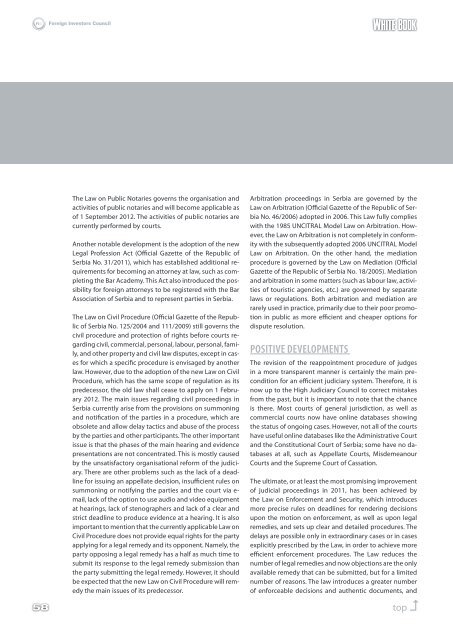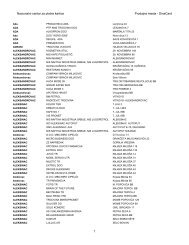Fic rEcommEndationS - Eurobank EFG
Fic rEcommEndationS - Eurobank EFG
Fic rEcommEndationS - Eurobank EFG
You also want an ePaper? Increase the reach of your titles
YUMPU automatically turns print PDFs into web optimized ePapers that Google loves.
The Law on Public Notaries governs the organisation and<br />
activities of public notaries and will become applicable as<br />
of 1 September 2012. The activities of public notaries are<br />
currently performed by courts.<br />
Another notable development is the adoption of the new<br />
Legal Profession Act (Official Gazette of the Republic of<br />
Serbia No. 31/2011), which has established additional requirements<br />
for becoming an attorney at law, such as completing<br />
the Bar Academy. This Act also introduced the possibility<br />
for foreign attorneys to be registered with the Bar<br />
Association of Serbia and to represent parties in Serbia.<br />
The Law on Civil Procedure (Official Gazette of the Republic<br />
of Serbia No. 125/2004 and 111/2009) still governs the<br />
civil procedure and protection of rights before courts regarding<br />
civil, commercial, personal, labour, personal, family,<br />
and other property and civil law disputes, except in cases<br />
for which a specific procedure is envisaged by another<br />
law. However, due to the adoption of the new Law on Civil<br />
Procedure, which has the same scope of regulation as its<br />
predecessor, the old law shall cease to apply on 1 February<br />
2012. The main issues regarding civil proceedings in<br />
Serbia currently arise from the provisions on summoning<br />
and notification of the parties in a procedure, which are<br />
obsolete and allow delay tactics and abuse of the process<br />
by the parties and other participants. The other important<br />
issue is that the phases of the main hearing and evidence<br />
presentations are not concentrated. This is mostly caused<br />
by the unsatisfactory organisational reform of the judiciary.<br />
There are other problems such as the lack of a deadline<br />
for issuing an appellate decision, insufficient rules on<br />
summoning or notifying the parties and the court via email,<br />
lack of the option to use audio and video equipment<br />
at hearings, lack of stenographers and lack of a clear and<br />
strict deadline to produce evidence at a hearing. It is also<br />
important to mention that the currently applicable Law on<br />
Civil Procedure does not provide equal rights for the party<br />
applying for a legal remedy and its opponent. Namely, the<br />
party opposing a legal remedy has a half as much time to<br />
submit its response to the legal remedy submission than<br />
the party submitting the legal remedy. However, it should<br />
be expected that the new Law on Civil Procedure will remedy<br />
the main issues of its predecessor.<br />
Arbitration proceedings in Serbia are governed by the<br />
Law on Arbitration (Official Gazette of the Republic of Serbia<br />
No. 46/2006) adopted in 2006. This Law fully complies<br />
with the 1985 UNCITRAL Model Law on Arbitration. However,<br />
the Law on Arbitration is not completely in conformity<br />
with the subsequently adopted 2006 UNCITRAL Model<br />
Law on Arbitration. On the other hand, the mediation<br />
procedure is governed by the Law on Mediation (Official<br />
Gazette of the Republic of Serbia No. 18/2005). Mediation<br />
and arbitration in some matters (such as labour law, activities<br />
of touristic agencies, etc.) are governed by separate<br />
laws or regulations. Both arbitration and mediation are<br />
rarely used in practice, primarily due to their poor promotion<br />
in public as more efficient and cheaper options for<br />
dispute resolution.<br />
PoSitiVE dEVELoPmEntS<br />
The revision of the reappointment procedure of judges<br />
in a more transparent manner is certainly the main precondition<br />
for an efficient judiciary system. Therefore, it is<br />
now up to the High Judiciary Council to correct mistakes<br />
from the past, but it is important to note that the chance<br />
is there. Most courts of general jurisdiction, as well as<br />
commercial courts now have online databases showing<br />
the status of ongoing cases. However, not all of the courts<br />
have useful online databases like the Administrative Court<br />
and the Constitutional Court of Serbia; some have no databases<br />
at all, such as Appellate Courts, Misdemeanour<br />
Courts and the Supreme Court of Cassation.<br />
The ultimate, or at least the most promising improvement<br />
of judicial proceedings in 2011, has been achieved by<br />
the Law on Enforcement and Security, which introduces<br />
more precise rules on deadlines for rendering decisions<br />
upon the motion on enforcement, as well as upon legal<br />
remedies, and sets up clear and detailed procedures. The<br />
delays are possible only in extraordinary cases or in cases<br />
explicitly prescribed by the Law, in order to achieve more<br />
efficient enforcement procedures. The Law reduces the<br />
number of legal remedies and now objections are the only<br />
available remedy that can be submitted, but for a limited<br />
number of reasons. The law introduces a greater number<br />
of enforceable decisions and authentic documents, and<br />
58 top �




